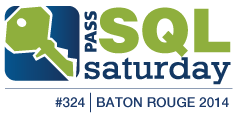 Jeffrey Verheul (blog | twitter) is hosting TSQL Tuesday. He thought of a great topic: SQL Family and community.
Jeffrey Verheul (blog | twitter) is hosting TSQL Tuesday. He thought of a great topic: SQL Family and community.
I first heard about the SQL community by way of the SQL Saturday in Baton Rouge (Aug 2012). I hadn't heard of anything like that before. I didnt have a twitter account and I hadnt been in a true DBA role, so when I wanted to learn more, I just thought of books. Once I went to the SQL Sat BR, it was like a whole new world opened up for me. I loved how the leaders interacted with each other, joking and kidding around - and honestly - I wanted that! I was a little too much in AWE of everything that day to approach anyone, but left with some awesome tips I had learned and couldnt wait for more.
I learned about their user group and even though I was an hour away, I wanted to attend. Life got in the way, so I didnt attend many in that next year. However, when 2013 rolled around, I decided to throw my hat in the ring and submitted to be a speaker. I had some previous experience with public speaking, so I was only nervous about the technical content portion. They chose me and after I presented, I realized I was completely addicted! I was thrilled to meet people who I had learned from the previous year. It was an amazing experience all around.
I have since spoken at the user group in Baton Rouge, this year's SQL Saturday in Baton Rouge (cant get enough of them), at 2 virtual chapters, and the SQL Saturday in Dallas (Nov 2013). Each time I have had the priviledge of meeting more and more people; each time I get a little awe-struck, and each time I feel relaxed and at ease when actually talking with them.
I have since started a user group here in Lafayette, LA (although I still travel to BR for meetings too). One of the main reasons I started the group was to have people closer to home that I could connect with in the same way I do with others throughout the community. It is amazing to know that even though I have a lot I need to learn, I havent met anyone who judges me negatively for that. In fact, it is quite the opposite. I dont know of any other IT community who responds to others in such an overall friendly way and I feel priviledged that I get to be a part of it.
P.S. - I mistakenly put someone else's name as the host for this month - and it turned into yet another example of how great this community is. I hadnt talked with him before, but I guarantee you when I meet him I will remember this and based on his messages, we will both chuckle in a nice way. :)





